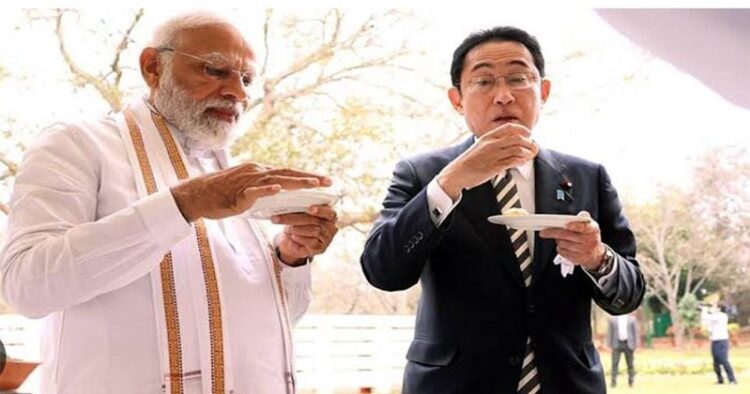Visiting Japanese Prime Minister Fumio Kishida has said that both India and Japan can play important roles when the world is “standing at history’s turning point, fraught with difficulties”.
At the end of bilateral talks with PM Modi, Japanese Prime Minister Fumio Kishida said, “I believe that Japan and India are in an extremely unique position in the current international relations and, furthermore, in the history of the world… I have always viewed with great respect the way such a huge and diverse country as India has developed democracy.”
“The people of the two countries humbly acknowledge that there are diverse values, cultures and histories on this planet, and that fully understanding them is not an easy task. We are the kind of people who understand intuitively that the best way forward is to respect the other party and cooperate through dialogue,” he said.
The reference is the manner China has pushed its aggressive policies in more ways than one.
Fumio Kishida emphasised that India is “indispensable” in Tokyo’s plan for a “Free and Open Indo-Pacific”. PM Modi also underlined the importance of the India-Japan partnership for a stable Indo-Pacific.
The India-Japan Special Strategic and Global Partnership is based on shared democratic values and respect for the rule of law in the international arena, PM Modi said. “Strengthening this partnership is not only important for both our countries, it also promotes peace, prosperity and stability in the Indo-Pacific region,” he said.
The Japanese Prime Minister Fumio Kishida unveiled a new plan for a free and open Indo-Pacific that envisages India as an “indispensable partner” for preventing coercion and upholding a rules-based order.
China’s territorial claims in the East China and South China seas have rattled countries in Southeast Asia as well as Japan.
Sources said the Russia-Ukraine conflict figured prominently during the working lunch after the bilateral meeting.
Japan’s Cabinet Secretary for Public Affairs, Noriyuki Shikata, said: “Japan Prime Minister Fumio Kishida was straightforward…they should not condone any unilateral change of status quo, including in Asia.”
Fumio Kishida’s Tokyo-led initiative in the Indo-Pacific for greater security and economic cooperation is geared toward curbing the growing assertiveness of any other country. It will include Japan’s assistance to emerging economies, support for maritime security, a provision of coast guard patrol boats and equipment and other infrastructure cooperation.
Japan’s Prime Minister Fumio Kishida invited his Indian counterpart PM Modi for the group of seven major industrial nations’ summit – G7 – in May at Hiroshima, which the Prime Minister accepted.
Foreign Secretary Vinay Mohan Kwatra later said India and Japan signed two documents on the sidelines of the bilateral talks. The agreements include the Renewal of the Memorandum of Cooperation in the Japanese language and the Exchange of notes on JICA loan for 300 billion Yen on the Mumbai-Ahmedabad high-speed railway project.
PM Modi expressed his desire with Prime Minister Fumio Kishida to declare the next year as the year of Youth Exchanges between the two countries, the Foreign Secretary said.
Vinay Mohan Kwatra said that India and Japan have been talking about how India and Japan can cooperate on the Act East. They are talking about how connectivity projects can be built which link India’s North-East with the rest of the countries that fall under Act East.
“We had a fruitful discussion on the importance of reliable supply chains in semiconductors and other critical technologies. Last year, we set a target of Japanese investment of five trillion yen in India in the next five years…It is a matter of satisfaction that there has been good progress in this direction,” PM Modi said.
The two leaders concurred on the need for close cooperation for the successful hosting of the G7 in Japan and G20 Summit in India, Fumio Kishida said.




















Comments